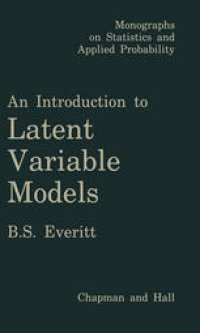
Ebook: An Introduction to Latent Variable Models
Author: B. S. Everitt (auth.)
- Tags: Science general
- Series: Monographs on Statistics and Applied Probability
- Year: 1984
- Publisher: Springer Netherlands
- Edition: 1
- Language: English
- pdf
Latent variable models are used in many areas of the social and behavioural sciences, and the increasing availability of computer packages for fitting such models is likely to increase their popularity. This book attempts to introduce such models to applied statisticians and research workers interested in exploring the structure of covari ance and correlation matrices in terms of a small number of unob servable constructs. The emphasis is on the practical application of the procedures rather than on detailed discussion of their mathe matical and statistical properties. It is assumed that the reader is familiar with the most commonly used statistical concepts and methods, particularly regression, and also has a fair knowledge of matrix algebra. My thanks are due to my colleagues Dr David Hand and Dr Graham Dunn for helpful comments on the book, to Mrs Bertha Lakey for her careful typing of a difficult manuscript and to Peter Cuttance for assistance with the LlSREL package. In addition the text clearly owes a great deal to the work on structural equation models published by Karl Joreskog, Dag Sorbom, Peter Bentler, Michael Browne and others.
1 General introduction.- 1.1 Introduction.- 1.2 Latent variables and latent variable models.- 1.3 The role of models.- 1.4 The general latent model.- 1.5 A simple latent variable model.- 1.6 Estimation and goodness-of-fit.- 1.7 Path diagrams.- 1.8 Summary.- 2 Factor analysis.- 2.1 Introduction.- 2.2 Explanatory and confirmatory factor analysis.- 2.3 The factor analysis model.- 2.4 Identifiability of the factor analysis model.- 2.5 Estimating the parameters in the factor analysis model.- 2.6 Goodness-of-fit tests.- 2.7 Rotation of factors.- 2.8 Numerical examples.- 2.9 Confirmatory factor analysis.- 2.10 Summary.- 3 The LISREL model.- 3.1 Introduction.- 3.2 The LISREL model.- 3.3 Identification.- 3.4 Estimating the parameters in the LISREL model.- 3.5 Instrumental variables.- 3.6 Numerical examples.- 3.7 Assessing goodness-of-fit.- 3.8 Multigroup analysis.- 3.9 Summary.- 4 Latent variable models for categorical data.- 4.1 Introduction.- 4.2 Factor analysis of binary variables.- 4.3 Latent structure models.- 4.4 Summary.- 5 Some final comments.- 5.1 Introduction.- 5.2 Assessing the fit of latent variable models by cross-validation procedures.- 5.3 Latent variables — fact or fiction?.- 5.4 Summary.- Appendix A Estimating the parameters in latent variable models; a brief account of computational procedures.- Appendix B Computer programs for latent variable models.- Exercises.- References.